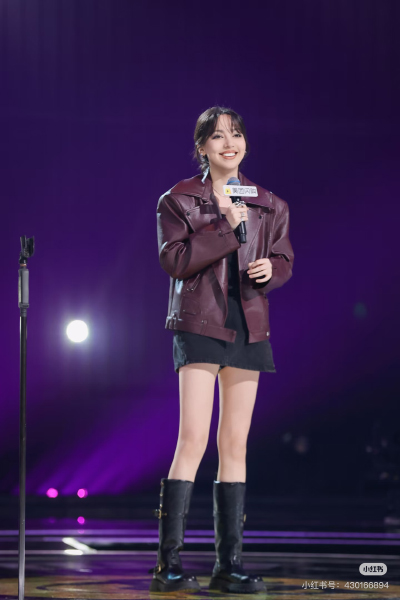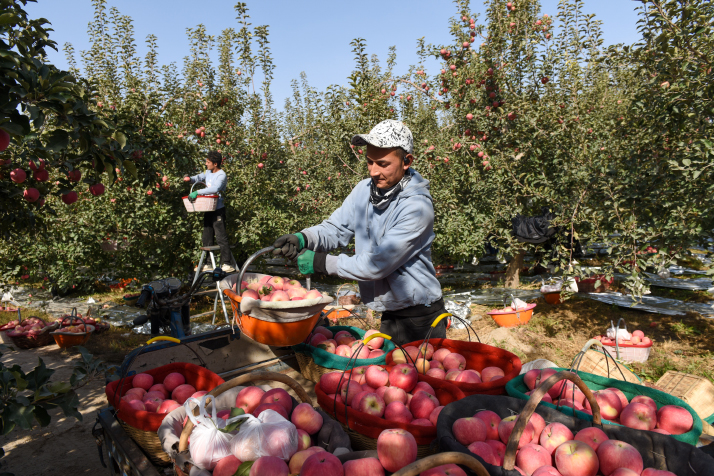| Xinjiang Today |
| Standing Up for Self-Identity | |
| A woman with low self-esteem builds a platform for herself by blending traditional and modern comedy | |
|
|
 Xiaopa on stage. An image from her RedNote account in July (SCREENSHOT)
As the lights dimmed and the gaze of the audience focused on her, Paziliya Parhat, who uses the stage name Xiaopa, adjusted the microphone and began to speak: "Every time I stand on this stage, I desperately try to make everyone see me—begging, 'Please, just look at me'." That was the second season of Stand-Up Comedy and Friends. By that time, the young woman from Xinjiang's desert city Aksu, who once struggled with low self-esteem, had begun to blossom into an artist in an arena that is still male-dominated. Her own life, where she once felt tormented, is now the inspiration for her acts, which she uses to laugh at the slings and arrows of fortune.  Xiaopa featured in Chen Luyu's online show, The Women You Meet, for an interview in August (SCREENSHOT)
The seeds of magic The 33-year-old's childhood memories are filled with the luscious red apples of Aksu and laughter. "My grandfather was a very humorous person who often told qakqak jokes," she told China Women's News. Qakqak is a Uygur folk humor form similar to stand-up comedy, with witty dialogues and gentle teasing, often found in gatherings of relatives and friends. Listening to her grandfather's stories planted the seeds of humor in Xiaopa's heart. "I found humorous people incredibly charming. They can bring everyone together with laughter," she said. The seeds began to grow during her university years. While studying Russian at Tianjin Normal University, she stumbled upon a performance video of American comedian Kevin Hart. "One person and one microphone electrified the entire room. It was magical," she said. At that time, she didn't think of becoming a stand-up artist. After graduation, she too joined the ranks of beipiao—people who venture out to Beijing in pursuit of their dreams, moving from one Internet company to another to survive. But nothing seemed to work out, and nothing seemed to interest her until Christmas night in 2019. From audience to stage "I went to a show with a friend and it unexpectedly changed the trajectory of my life," Xiaopa said. That night, in a small theater in Beijing, she watched a live stand-up performance for the first time. The immediate and genuine interaction between the performer and the audience captivated her. "After the show, I mustered enough courage to approach the club manager and say I want to do stand-up too." Her journey began with open-mic nights—events where aspiring comedians can get a platform to perform and gain experience. "I looked for jobs during the day and ran from club to club at night. On my busiest night, I would rush to four different venues to perform four times…I calculated the time to a nicety and staggered my shows so I could make it from one venue to another." The turning point came during the subsequent Spring Festival. A club owner approached her, saying: "Many of our performers are going home for the holiday. We need people for a new venue. Thirty shows in a row, 300 yuan ($42) per show. Are you in?" Xiaopa did the math quickly—it was enough to sustain her in Beijing. From that moment on, she became a full-time stand-up comedian. A journey of self-discovery Most of Xiaopa's material comes from her personal experiences, including routine daily things that many people do not give a second thought to. Take her classic hair salon act for example: "Why do hair stylists always ask, where did you get your hair cut last time? Isn't that like a current partner asking about an ex?" She pinpointed the core premise of the question—"Hair stylists trying to elevate themselves by belittling their peers"—and crafted a hilarious routine. "The hardest part of creation is finding a precise premise," she said. "Once you grasp that absurd core, the framework becomes clear… Many people take daily trivialities for granted, but I instinctively ask why, and sometimes, the more I think about them, the angrier I get." The second season of Stand-Up Comedy and Friends became a high point in her career. The audience lapped up her performances, she garnered 2.26 million likes on short-video platforms, and her topics began to trend on the Internet. She also won the Most Commercial Value Award. But few know that the poised and confident artist under the spotlight had once struggled with extremely low self-esteem. "I grew up under the critical gaze of my family, who would pick on everything, from my posture to how I walked," she shared. "Because I sat in the last row in class, my family assumed the teacher disliked me, completely ignoring the fact that I was the tallest student." Stand-up comedy helped her find herself. "The audience's laughter and recognition slowly built up my confidence," she wrote on social media platform Weibo. "You can't imagine how much it means to me when someone asks for a photo after a show or simply compliments me. It means far more than you think." Her journey continues. "This profession has its highlights and inevitably its lows, but it is the career where I found self-identity," she said.  Farmers pick apples in an orchard in Aksu Prefecture in October 2024 (XINHUA)
Women raising women up In the industry, there is a tacit understanding among the women artists. "Whenever I host shows in different cities, I try to have the clubs hire women performers to open the show whenever possible," Xiaopa said. "Every time there's one woman less on stage, there's one female voice less being heard." She is particularly grateful for the mutual support among women artists. When speaking about senior comediennes, her voice fills with gratitude: "Watching them shine on stage made me eager to be like them." In her own career, Xiaopa strives to help newcomers. Besides, whenever a woman friend expresses interest in trying stand-up comedy, she encourages and supports them. Her encounter with Chen Luyu, a famous TV host in China, left a lasting impression. "During the first competition, I had no confidence in my script. I just thought if Chen could understand even a small part of it, the effort would be worth it," she said. When her performance was over, Chen said, "Xiaopa, after hearing your story, I feel so angry!" Xiaopa felt an instant relief: "She truly understood my anger!" Later, appearing on Chen's podcast Flower on the Rock, a women's talk show launched by luxury brand GIADA, she reflected, "When stand-up comedy becomes a dagger thrust into past experiences, it turns into an outlet for my life."  A stand-up comedy performance in a theater in Beijing in November 2024 (VCG)
In a way, Xiaopa's success is a microcosm of cultural integration. She draws inspiration from Uygur folk humor form qakqak, rooted in the soil of Xinjiang, and uses the modern platform of stand-up comedy to enable more people to experience the charm of this cross-cultural humor. However, Xiaopa fears the industry could disappear one day. "If stand-up comedy ceases to exist, I will lose my direction. So I will keep writing my acts, stand on stage [performing them], and cheer on my peers." From Aksu to Beijing, from an Internet worker to a recognized stand-up artist, Xiaopa's journey proves one thing: No matter what the field, sincerity and staying true to oneself resonates with others. "Perhaps today's show didn't go well, or the next few months might be flat, but in the grand scheme of things, these ups and downs are insignificant," Xiaopa said. XT Comments to taozihui@cicgamericas.com |
|
||||||||||||||||||||||||||||
|